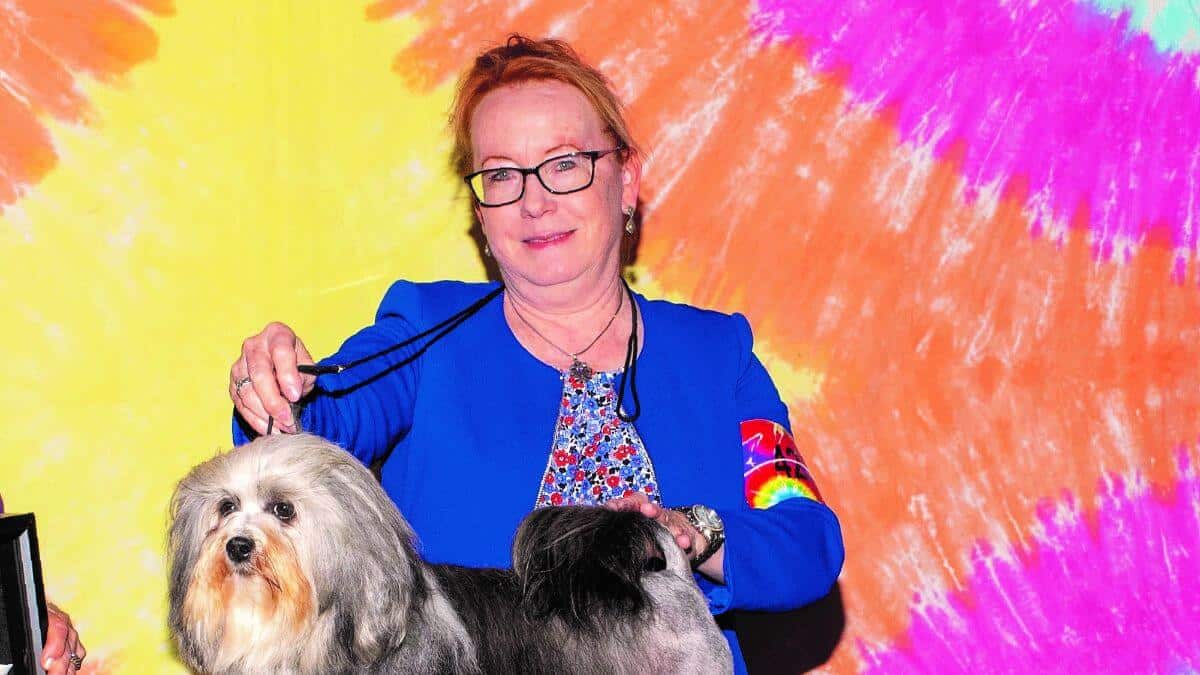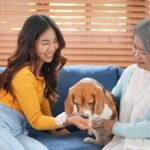Interview with Lisa Brown | Infinity Star Löwchen
Where do I live? How many years in dogs? How many years as a breeder?
Lisa Brown: I reside in Northern Virginia outside Washington, D.C. I have owned dogs for 20-plus years and have been in my breed and breeding for approximately fourteen (14) years. I work with my co-breeder, Jerry Davis, who resides in Tennessee and started in Afghan Hounds. He has been showing and breeding for 40 years.
What is my kennel name? How many dogs do I currently keep?
Lisa Brown: My kennel name is Infinity Star and my co-breeder’s kennel is Boondock’s. We have two bitches that we were showing for the last two years. One was the 2022 National Specialty BOS and the other bitch was the 2023 National Specialty BOS. We have now retired them and will be incorporating them into our breeding program. This year, we will show our two boys. We also have our seniors and retirees.
Which have been my most influential sires and dams?
Lisa Brown: GCHS Musicbox Boondock’s Goin’ Commando has been our most influential sire. He was a successful show dog and sire. He earned two Reserve Bests in Show and sired many lovely show, performance, and companion Löwchen. His offspring have produced many champions and helped with many breeding programs. His image is on the AKC Meet the Breed backdrop for Löwchen. For me, the most influential dam was my first bred-by. She was not a “natural” show dog and was a late bloomer. She taught me the valuable lesson that all dogs mature differently and come into their own at their own pace. GCHB Musicbox Infinity Star Bechamel DCAT TKN CGC matured into a competitive show dog. She produced better than herself, producing nice companion Löwchen and the 2022 National Special BOS winner. We bred these two together for our next generation show dog. Planning on finishing their son this year.
Can I talk a bit about my facilities? Where are my puppies whelped? How are they raised?
Lisa Brown: All of our puppies are whelped and raised in our homes. They have their own puppy room for whelping and quiet time with the dam. We employ Puppy Culture for positive experiences and stimulation. As the puppies mature, they move to the central part of the house, the living room. This gives the puppies their initial experience of what life has to offer and all the sounds of ordinary living with us humans. Next, the puppies’ world expands with exposure to different environments, car rides, the vet, and local hardware store, anywhere that will bring exposure to new experiences. Since this is a companion breed, we make them very much a part of our lives so that they can easily transition to their new families and into their next adventures and experiences.
What is my “process” for selecting show puppies? Performance puppies?
Lisa Brown: We have the puppies evaluated by someone outside of our breed to provide an unbiased opinion of structure. This is the foundation for show and performance. Next, we look at early attitudes and personality. We prefer outgoing personalities and puppies that can rebound from new experiences.
Does my breed require any special preparation for competing in Conformance? In Performance Events?
Lisa Brown: This is a coated breed and requires a great deal of coat maintenance for show. For Conformation or Performance, the dogs require conditioning—body and mind. Löwchen are quick to learn, playful, and often just downright silly. They do not like to drill, so you have to make (and keep) training fun.
In my opinion, is my breed in good condition overall? Any trends that warrant concern?
Lisa Brown: Löwchen are on the AKC Low Entry Breeds list. The breed does not have many breeders and we have small litters. With the Standard’s size of 11–14 inches, which may vary one inch above or below, our Löwchen are getting bigger and losing their type and movement. The Löwchen is in the Toy Group in other countries.
Is my breed well suited to be a family dog? Who are the best candidates to own my breed?
Lisa Brown: Anyone who loves dogs is the best candidate. The Löwchen can be raised with other breeds, big and small. They enjoy a family life with children and seniors. They can be high-energy and couch-potatoes. They make good travelers, and most will fit comfortably in the airplane cabin, snugly nestled by your feet.
What is the biggest misconception about my breed? What is my breed’s best-kept secret?
Lisa Brown: The biggest misconception is that the coat does not grow on the bum. No, we clip it. Puppies are first clipped at about 4-5 weeks. Best-kept secret? They can do anything! Conformation. Performance. Couch surfing.
As a Preservation Breeder, can I share my thoughts on the sport today. How’s the judging these days? What do I think about the number of shows?
Lisa Brown: For a rare breed, a lot of shows makes it harder to find majors. This necessitates entering shows and potentially forfeiting entry fees, or traveling greater distances to finish dogs. Some judges are not familiar with the Standard and do not consider these breeds in the Groups.
In my opinion, is social media good for the sport? Is it harmful?
Lisa Brown: In my opinion, the downside of social media is the trend to air one’s grievances about competitors and judges. However, social media provides a simple and easy way to meet new people and exchange ideas and information. It’s a great platform to share the love of our dogs, and a great way to share dog show videos and live streaming with our fellow dog lovers who could not attend the show.
What are the biggest challenges facing the dog show community as a whole today and how can these be addressed?
Lisa Brown: We are losing top breeders. These top breeders seem to be retiring faster than we can bring in new breeders. Perhaps this can be addressed by working with Juniors and developing a program focused on proper and responsible breeding. Another issue I see is a lack of mentors to help new competitors and new breeders. This issue could be addressed by the establishment of a Mentor’s Cadre through which people who are willing to be mentors are matched with mentees with similar interests and goals.
What are some of the positive changes I’ve seen in my profession and in the dog show community over the past decade?
Lisa Brown: More breeders are health testing and posting results with the desire to produce better and healthier dogs, not just for show and performance but for our loving companion homes.
Technology has improved our ability to train our dogs through online courses and video lessons. Livestream your performance and your off-site mentor or coach can provide feedback within minutes. I’ve received many feedback sessions in my car to and from the show site. They’ve been a great help to improve my performance.
If I could share one suggestion with judges of my breed, what would I like to say to them about my breed?
Lisa Brown: Look beyond color. Any color is acceptable in the breed.
For a bit of fun, what’s the most amusing thing I’ve ever experienced with a Non-Sporting Dog?
Lisa Brown: I was showing my bitch in Conformation. I took her off the table after the judge’s exam, and as I was setting her down her rear paw got caught in the zipper pull of my suit jacket. As I was trying to get her paw out, she launched up on my shoulder as the judge turned to see what was taking me so long. After the down and back, the judge remarked, “Well, she certainly is a wild thing.” (I do not wear that suit anymore.)








